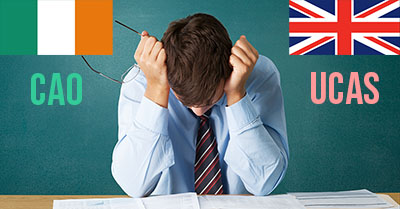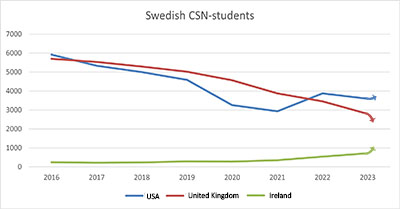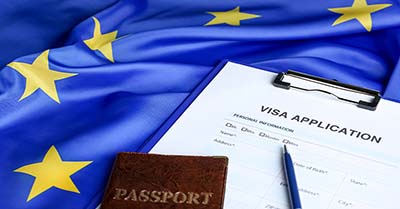Student visa to the United Kingdom
Do you want to study in the United Kingdom? Then you will most likely need to apply for a student visa. Here we guide you through the application process step by step.
If you're an international student looking to study in the United Kingdom (England, Wales, Scotland, and Northern Ireland), you will likely need a student visa. In this article, we will provide you with step-by-step instructions on how to apply for a student visa, including what types of visas are available, whether you need a visa for all course lengths, what you need to apply, the application process, and how much it costs.
Do you need a student visa for all course lengths?
Step one is to get accepted to a school in the UK
Make sure that you have enough money to cover all your costs
What do you need to apply for a student visa?
Do I need a health insurance to get a student visa to the UK?
When can I travel to the UK after I get my visa?
How can I get more help with the application for schools and visa to the UK?
Types of student visas
There are two main types of student visas available in the UK: student visa (formerly known as the Tier 4 General) and the Short-term study visa. In this article we will focus on the long term student visa.
The student visa is for all students who are 16 or older and are coming to the UK for more than six months to study. This visa allows you to work part-time during your studies and full-time during breaks. It is valid for the length of your course plus some additional time (usually four months).
The Short-term study visa is for non-EU students who are coming to the UK for a course of six months or less. This visa does not allow you to work while you're in the UK, and you cannot extend it.
You do not need to apply for a visa if you have pre-settled status under the EU settlement scheme (i.e. if you have already lived in the UK for an extended period of time and applied for this status before June 30, 2021).
Do you need a student visa for all course lengths?
If your course is longer than six months, you will need a Student visa regardless of where you are from. If your course is six months or less, you should apply for a Short-term study visa if you are not an EU-citizen.
EU-citizens can travel to the UK without a visa for courses that are 6 months or shorter. Your passport must be valid for the entire duration of your stay. It is recommended that your passport should be valid for at least six months beyond your intended date of departure from the UK.
In addition to a valid passport, you may also need to provide evidence of your return or onward travel, such as a return plane ticket or proof of onward travel to another country. You may also be asked to show proof of your accommodation in the UK and your financial means to support yourself during your stay. It is always a good idea to carry these documents with you when traveling to the UK, even if they are not required for visa-free travel.
Step one is to get accepted to a school in the UK
You cannot get a student visa to the UK if you are not accepted to a school there. So the first step is to find and apply to a school you want to attend. Fill out our info request form if you want help with this.
Once you have been accepted to a college or university in the UK they will sponsor you visa by issuing a Confirmation of Acceptance for Studies (CAS). The CAS is a unique reference number that you will receive from your institution once you have been accepted onto a course. The CAS is a key document in your Student Visa application. It contains important information about your course, including the start and end dates, the cost of the course, and details of your course provider. You should check that the information on your CAS is correct, as this information will be used by the UK Visas and Immigration to assess your visa application.
Make sure that you have enough money to cover all your costs
You will need to prove that you have enough money to cover your tuition fee for 1 academic year (the amount will be written on your CAS). On top of that you need to prove that you can support yourself and cover your living costs unless you are from a country that don’t need to show financial evidence.
The amount required for living costs, when this is written in 2023, is £1,334 per month for courses taking place inside London (where living costs are high), and £1,023 per month for courses outside London.
What do you need to apply for a student visa?
You can apply for a student visa to the United Kingdom at the earliest 6 months before you start your course (the start date written on your CAS). To apply for a student visa, you will need the following:
- A valid passport with at least six months of validity remaining.
- A Confirmation of Acceptance for Studies (CAS) from a UK university or college (see above).
- Evidence that you can support yourself financially during your studies. As explained above. You can show this by providing bank statements or a letter from your sponsor. The money must have been in your bank for at least 28 consecutive days and the end of this time period must be withing 31 days of applying for your visa.
- A tuberculosis (TB) test result, if you are from a country where tuberculosis is common.
- Evidence of your English language proficiency, if required by your course or university. This is usually done already when applying to your university or college. You need to prove that you have CEFR level B2 or above.
- You may also need to provide additional documents, such as academic transcripts or certificates, depending on your course and university. Students under the age of 18 need a proof and consent of a legal guardian, and students who wants to study subjects like Military Technology will need an ATAS certificate.
The application process
To apply for a student visa, you will need to follow these steps:
- Fill out the online application form on the UK government website.
- Pay the visa application fee and the Immigration Health Surcharge (IHS), which provides access to the UK's National Health Service (NHS) during your stay. See the headline How much does it cost, below.
- Book an appointment at a visa application center (VAC) to provide your biometric information (fingerprints and a photograph) and submit your documents. Alternatively you can do this with the UK Immigration: ID Check app if you have a Biometric passport from EU/EES or Hong Kong.
- Attend your appointment at the VAC and provide your biometric information and documents.
Wait for a decision on your visa application.
You usually get the decision within three weeks and you might be able to pay for faster processing. The processing time for a student visa can vary depending on your country of origin and the time of year. You should apply for your visa as early as possible to avoid delays.
How much does the visa cost?
The cost of a student visa can vary depending on your country of origin, the length of your course, and whether you are applying from inside or outside the UK. As of 2024, the visa application fee is £490. There is also an Immigration Health Surcharge. See below.
Do I need a health insurance to get a student visa?
You will need to pay an Immigration Health Surcharge (IHS) as part of your visa application if you study in the UK on a student visa. This provides you with access to the National Health Service (NHS) during your studies. The current rate for the IHS is £776 per year, and you will need to pay this upfront for the full length of your visa. However, you will get a refund if you are denied visa or if you withdraw your visa application.
EU and Swiss nationals must also pay the IHS when applying for a student visa to the UK. However, students who has the European Health Insurance Card (EHIC) and don’t intend to work in the UK can apply for a refund of IHS after their visa has been granted. Please note that you must be covered by IHS if you intend to work in the UK. Read more about IHS reimbursement for EU and Swiss students.
In addition to the IHS, you may want to consider taking out private health insurance to cover additional medical expenses, such as dental treatment or repatriation costs, and to mitigate non health care related risks such as theft, liability etc. This is often required by your school. The cost of private health insurance can vary depending on your individual circumstances, such as your age and medical history, so it's important to shop around to find the best deal. Find more info and recommended study abroad insurances here.
When can I travel to the UK after I get my visa?
You can enter the UK 1 month before your courses starts if the course lasts more than 6 months, and up to seven days before the start date of your course if your course lasts 6 months or less. The course start date is stated on your CAS (Confirmation of Acceptance for Studies).
The start date of your visa will be shown on your visa sticker or in your visa approval letter. You should not attempt to travel to the UK before the start date of your visa, as you will most likely be refused entry. Your visa will also state an end date. If you wish to stay in the UK after this date you must renew your visa before it expires or apply for another visa. After you complete your degree in the UK, you will be eligible to apply for a two year post-study work visa, allowing you to stay and work in the UK for up to two years.
When you arrive in the UK, you will need to show your passport and your visa at the UK border. You may also be asked to provide evidence of your course of study, your accommodation arrangements, and your financial means to support yourself during your stay.
How can I get more help with the application for schools and visa to the UK?
In conclusion, applying for a student visa to the UK can seem overwhelming, but with careful planning and preparation, it can be a smooth process. Our EU students find the UK visa process quite straightforward and are usually able to complete it with ease. Remember to check the requirements for your specific course and university, and apply for your visa as early as possible to ensure a timely decision.
We have a partner who can help you to choose and apply to all UK universities. If you need further support, they can also refer you to a visa agent to assist you. Fill out our info request form to get help.
Best of luck with your studies in the UK!
Disclaimer: Please note that the UK authorities can make changes to the visa application process without notifying us. Different rules can apply to different nationalities so always read the instructions from the immigration authorities carefully. The information in the article above is correct to the best of our knowledge but we cannot be held responsible for any error that might occur without our knowledge. When in doubt always trust the official sources and check with the UK embassy if needed. You will find updated information at GOV.UK
More information
You might also be interested in our article Study in England, Scotland, and Wales
Follow @dreamstudiesabroad on Facebook, Instagram, Tiktok, or Youtube to get updated about our new schools and articles.






















